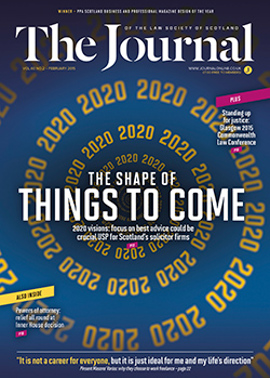Socially acceptable?

Social media and their unparalleled reach to the public remain for non-digital natives (which is still likely to include the majority of employers) a concerning prospect. The ability of an employer to deal fairly with an employee’s comments on Twitter and/or Facebook when the misdemeanour occurs outwith work, or using a private account, remains a contentious area.
Cautionary tales often appear in the media, such as the summary dismissal of a stockbroker who “joked” on Twitter about colliding with a cyclist but having to leave the scene immediately to avoid being late for work. In the last month, a video posted by a trainee of a Magic Circle firm concerning the events at Charlie Hebdo has also attracted attention.
Over the last few years, some of the issues that social media can cause have received judicial scrutiny, but until recently, the leading case providing guidance was in the English High Court: Smith v Trafford Housing Trust [2012] EWHC 3221. That case involved Smith, an employee of his local council who expressed views (based on his religious beliefs) regarding same sex marriage on a Facebook page. He had identified his employer, and his privacy settings allowed “friends of friends” to see his posts. This meant that such posts appeared on other people’s account pages even if they had not specifically subscribed to Smith’s feed. He was dismissed, and challenged his termination successfully. The court held that the extent of an individual’s right to privacy and freedom of expression in this context could well depend on the nature of their employment. In this case, however, the Facebook page did not have the necessary work-related nature to justify the employer’s actions.
Private account, public domain
A situation involving some similarities arose in late 2014 before the Employment Appeal Tribunal. Game Retail Ltd v Laws UKEAT/0188/14 has provided some useful guidance, but also leaves other questions unanswered. As practitioners deal with more queries from employer clients faced with the challenges of employees’ use of social media platforms, it is useful to consider the law as it stands.
Laws, a longserving employee of Game Retail Ltd, had a personal Twitter account. His employer operated a large number of stores in the UK, all of which had their own corporate social media presence. These accounts were very important to the employer’s business for the purposes of marketing and promotion. On this basis, they permitted customers to follow the individual stores’ Twitter feeds. Laws’ personal account followed a considerable number of stores, apparently so that he could monitor the feeds for inappropriate activity by other employees. Several stores (apparently as a result of encouragement from a manager) reciprocally followed Laws.
In mid-2013, a manager complained to Game Retail about some of Laws’ tweets. Following an investigation and a disciplinary process, he was dismissed on the grounds of gross misconduct. The basis for this was that his tweets contained offensive and abusive language.
He successfully challenged the decision at an employment tribunal, which found his dismissal unfair (albeit it reduced his compensation due to his contributory conduct). The tribunal held that the dismissal did not fall within the “band of reasonable responses” in terms of Iceland Frozen Foods Ltd v Jones [1982] IRLR 439. Among the reasons for the tribunal’s decision was the fact that the tweet came from a private account (which had not been set up for work purposes); that it did not identify Game Retail as Laws’ employer; and an apparent lack of clarity in the employer’s policy on social media, which was also regarded as important.
Relevant factors?
The employer appealed. The EAT allowed the appeal and remitted the case back to a new tribunal. In its decision, the EAT confirmed that the employer was entitled to take into account Laws’ failure to manage his privacy settings properly. Of particular significance, he knew that his comments would be seen by colleagues and tangentially customers (who had specifically chosen to follow his Twitter feed). He had followed the accounts of 100 Game stores and, indeed, 65 had followed him back. On that basis, despite the fact that it was a personal Twitter account and the tweets were not sent during work hours, Laws could not claim privacy as a defence.
Equally, it was felt that the tribunal had given too much weight to the points that Laws was not directly identified as an employee of Game Retail Ltd, and that the relevant tweeting occurred outwith work time. While such factors were important, the tribunal should have focused on the offensive nature of the tweets. Laws had argued that the tribunal had not established that anyone had actually been offended by his tweets and this was, in his submission, a crucial omission. The EAT disagreed.
Unfortunately (for practitioners and employers alike), the EAT refused to set down any specific guidance on the use (or rather misuse) of social media, despite being urged to so by the respondent in this case. Instead, it found that the tribunal had failed to look at the situation objectively and had instead substituted its own mindset on the scenario rather than that of a reasonable employer. On that basis, the EAT reiterated the correct test to be applied, namely to look at what was the reasonable band of responses for a reasonable employer. It sent the case back to a new tribunal to look at the facts again and come to a decision on whether a dismissal in this situation was within the reasonable range of responses.
Back to first principles
In essence, while social media may be a relatively novel medium, employers have always had to deal with the misdemeanours of their employees, and sometimes this involves misconduct outside work. So in terms of what practitioners should be emphasising to our clients, most of it is a reiteration of first principles:
- A social media misdemeanour should be treated the same as any other accusation of misconduct, with a proper process being followed.
- If the comment on social media occurs on a “personal” account, that does not mean an employee has an automatic, unassailable right to privacy. Context and the nature of the comments are crucial, and a tribunal will consider these factors in detail. Who has access to the tweets or posts can also be very important.
- Employees are entitled to have a private life and (within legal limits) express personal views. Just because such views may not be in line with an employer’s own position, that does not automatically entitle the employer to act. The employer still needs to consider whether they amount to misconduct justifying a disciplinary sanction or dismissal.
- For some employers, criticism or adverse comment about their industry or their products can be particularly relevant. This was seen a few years ago when the dismissal of Apple employees who had criticised an Apple product was deemed fair. The fact that Apple had clearly prohibited such public comment by their employees within their policies was a powerful factor for the tribunal. If an employer can demonstrate reputational damage caused (or highly likely to be caused) by the employee’s actions, their justification for taking action is much clearer.
- Social media policies need to be clear. Game Retail’s own social media policy did not provide the necessary clarity (as to what would constitute gross misconduct), but this of itself was not sufficient to mean that a commonsense approach could not be taken. However, the absence of such a policy (or the fact that its terms are poor) does not prevent action being taken, albeit that it makes the battle potentially much tougher.
- Employees sometimes criticise colleagues (whether in apparent “banter” or otherwise) on social media, but do not identify the employer. Such comments may be made in what at first appears to be a private context. However, in some circumstances, an employer may still be justified in taking action, especially if the tweets or posts amount to bullying or harassment.
Most importantly, employers must be careful not to overreact just because something happens on social media. Social media do have a wide potential audience. Taking formal action against an employee can easily exacerbate a situation, thereby giving it a much higher prominence that might have occurred. It is always wise for an employer to pause before taking action, and this remains true in this context also.
Game Retail reminds us all that while technology changes, the tenets set down in the existing law as to how employers must deal with issues remain the same.
In this issue
- Supreme Courts: the US and UK compared
- Taking farmers to market
- Queuing up for Street Law
- Cash for your body
- Ivor Guild: an appreciation
- Reading for pleasure
- Journal magazine index 2014
- Opinion: Waqqas Ashraf
- Book reviews
- Profile
- President's column
- More benefits from development plan approval
- People on the move
- On track for 1 April
- In five years' time...
- Glasgow 2015: the three Rs
- Powers of attorney: the Inner House decides
- Freelancing goes mainstream
- Socially acceptable?
- Searching questions
- Separation and the stored embryo
- Effect, not cause: is obesity a disability?
- Goodbye to the Lamborghini?
- Scottish Solicitors Discipline Tribunal
- The dispute resolvers
- Take care with Lender Exchange
- Law reform roundup
- From the Brussels office
- Equal pay: a professional imperative
- Are you a cyber risk?
- Ask Ash
- Property in the spotlight
- Sweet smell of added value
- Legally IT: the evolving lawyer






